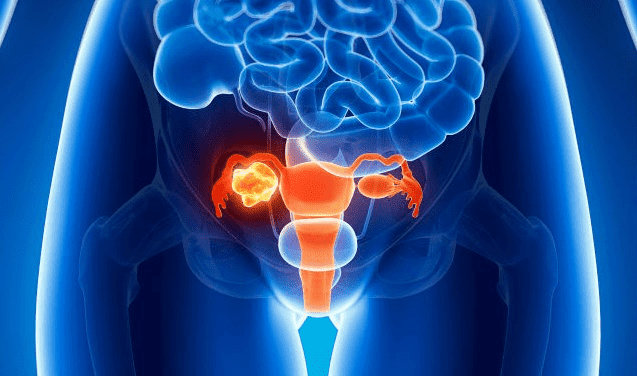Ovarian Cancer Symptoms And Treatment
Ovarian cancer symptoms and treatment - In early stages of ovarian cancer are no or hardly any complaints. This is because the ovaries are more or less free in the abdominal cavity. Complaints are generally quite vague and can be:
Ovarian Cancer Treatment
Ovarian cancer can be treated in different ways. The type of treatment depends on your situation.
Curative treatment
A curative treatment is a treatment that aims to cure you. There are several ways to treat ovarian cancer. Sometimes we use one way, sometimes a combination. Examples of curative treatments are:
Chemotherapy
Chemotherapy is a treatment with medication. The drugs destroy the cancer cells.
Surgery
It often happens that we treat ovarian cancer with surgery (a surgical procedure). There are two types of surgeries.
Staging surgery
With this surgery, the physician determines which stage the cancer is. If that is clear, he can immediately decide to remove certain organs and tissues (the uterus, both ovaries, the lymph node tissue along the pelvic vessels and the large body artery or the fat apron that lies in front of the gut). At different places in the lower and upper abdomen, pieces of tissue (biopsies) are removed for examination. The surgery is often followed by a treatment with chemotherapy.
Debulking surgery
If the preliminary examination clearly shows that the cancer tissue is also outside the ovaries, we try to eliminate that. We also remove both ovaries, the uterus, the fat apron and sometimes even a piece of intestine or another organ. Because of this, it can happen that you (temporarily) get a stoma. Sometimes it only becomes clear during the surgery that the tumor tissue is too large to be removed. Then the surgery is stopped in the meantime. We then try to reduce the tumor with chemotherapy. If that works, we will still operate.
Controls
For two years after the treatment, you will go to the doctor for a number of times. The first year is four times. During these checks, the specialist discusses how you are doing and a physical examination is done. We mainly check for metastases and the return of the disease.
Palliative treatment
Sometimes healing of ovarian cancer is no longer possible. That is not to say that the treatment then stops. We then continue with a new goal: living as long as possible with good quality. This called a palliative treatment. Examples are:
- thickening of the abdomen, through the fluid in the abdominal cavity (ascites)
- reduction of appetite
- vaginal blood loss (after menopause)
- rectal blood loss
- urge to urinate
- vague abdominal pain
- a bloated feeling
- nausea
- complaints of constipation
- urinate more often than usual
- excessive fatigue
- weight loss
Ovarian Cancer Treatment
Ovarian cancer can be treated in different ways. The type of treatment depends on your situation.
Curative treatment
A curative treatment is a treatment that aims to cure you. There are several ways to treat ovarian cancer. Sometimes we use one way, sometimes a combination. Examples of curative treatments are:
Chemotherapy
Chemotherapy is a treatment with medication. The drugs destroy the cancer cells.
Surgery
It often happens that we treat ovarian cancer with surgery (a surgical procedure). There are two types of surgeries.
Staging surgery
With this surgery, the physician determines which stage the cancer is. If that is clear, he can immediately decide to remove certain organs and tissues (the uterus, both ovaries, the lymph node tissue along the pelvic vessels and the large body artery or the fat apron that lies in front of the gut). At different places in the lower and upper abdomen, pieces of tissue (biopsies) are removed for examination. The surgery is often followed by a treatment with chemotherapy.
Debulking surgery
If the preliminary examination clearly shows that the cancer tissue is also outside the ovaries, we try to eliminate that. We also remove both ovaries, the uterus, the fat apron and sometimes even a piece of intestine or another organ. Because of this, it can happen that you (temporarily) get a stoma. Sometimes it only becomes clear during the surgery that the tumor tissue is too large to be removed. Then the surgery is stopped in the meantime. We then try to reduce the tumor with chemotherapy. If that works, we will still operate.
Controls
For two years after the treatment, you will go to the doctor for a number of times. The first year is four times. During these checks, the specialist discusses how you are doing and a physical examination is done. We mainly check for metastases and the return of the disease.
Palliative treatment
Sometimes healing of ovarian cancer is no longer possible. That is not to say that the treatment then stops. We then continue with a new goal: living as long as possible with good quality. This called a palliative treatment. Examples are:
- Palliative chemotherapy
- Radiotherapy (irradiation)
- A palliative surgery to remove (parts of) the tumor tissue
*Image source : NetDoctor
References :

Post a Comment for "Ovarian Cancer Symptoms And Treatment"